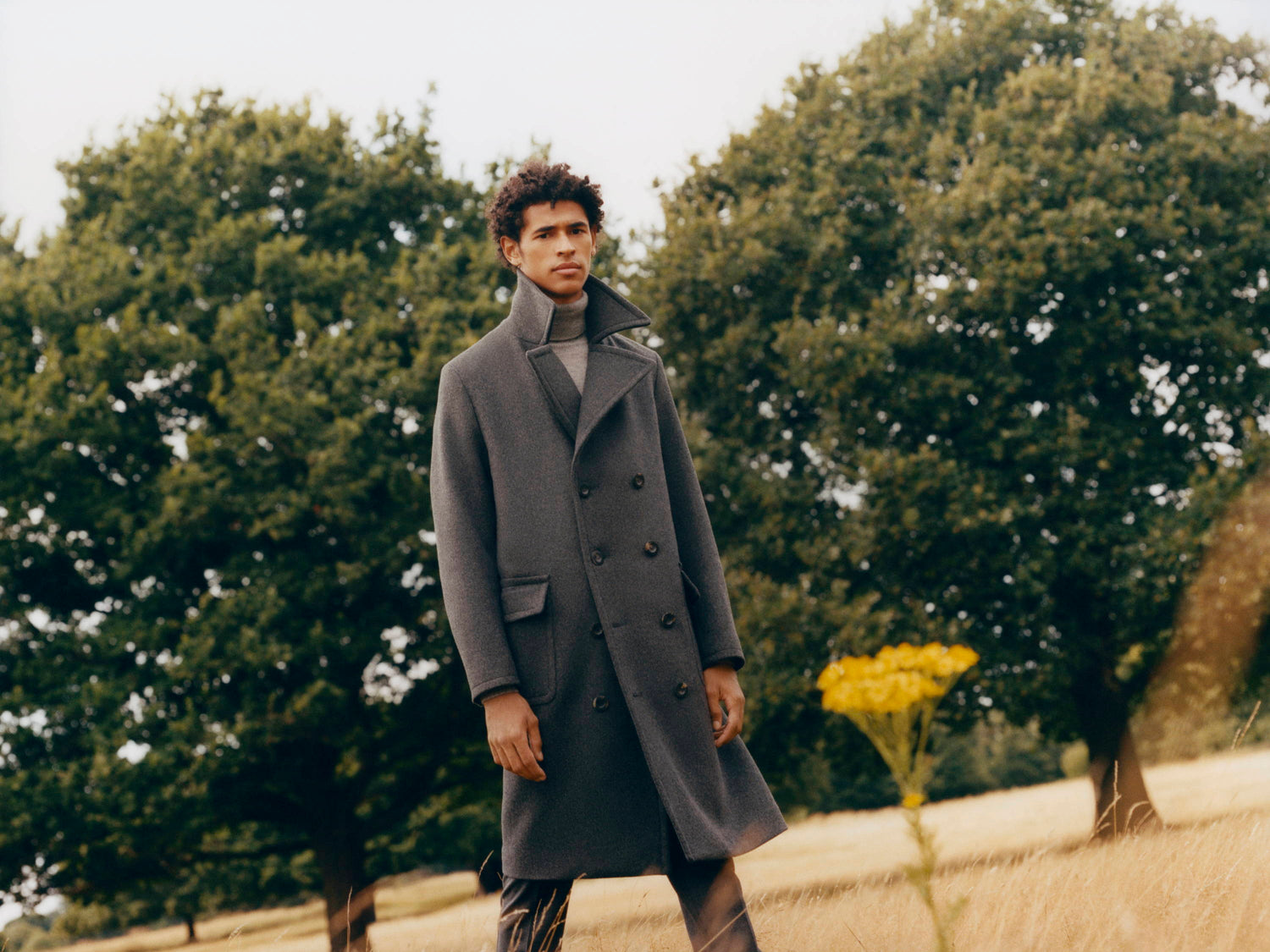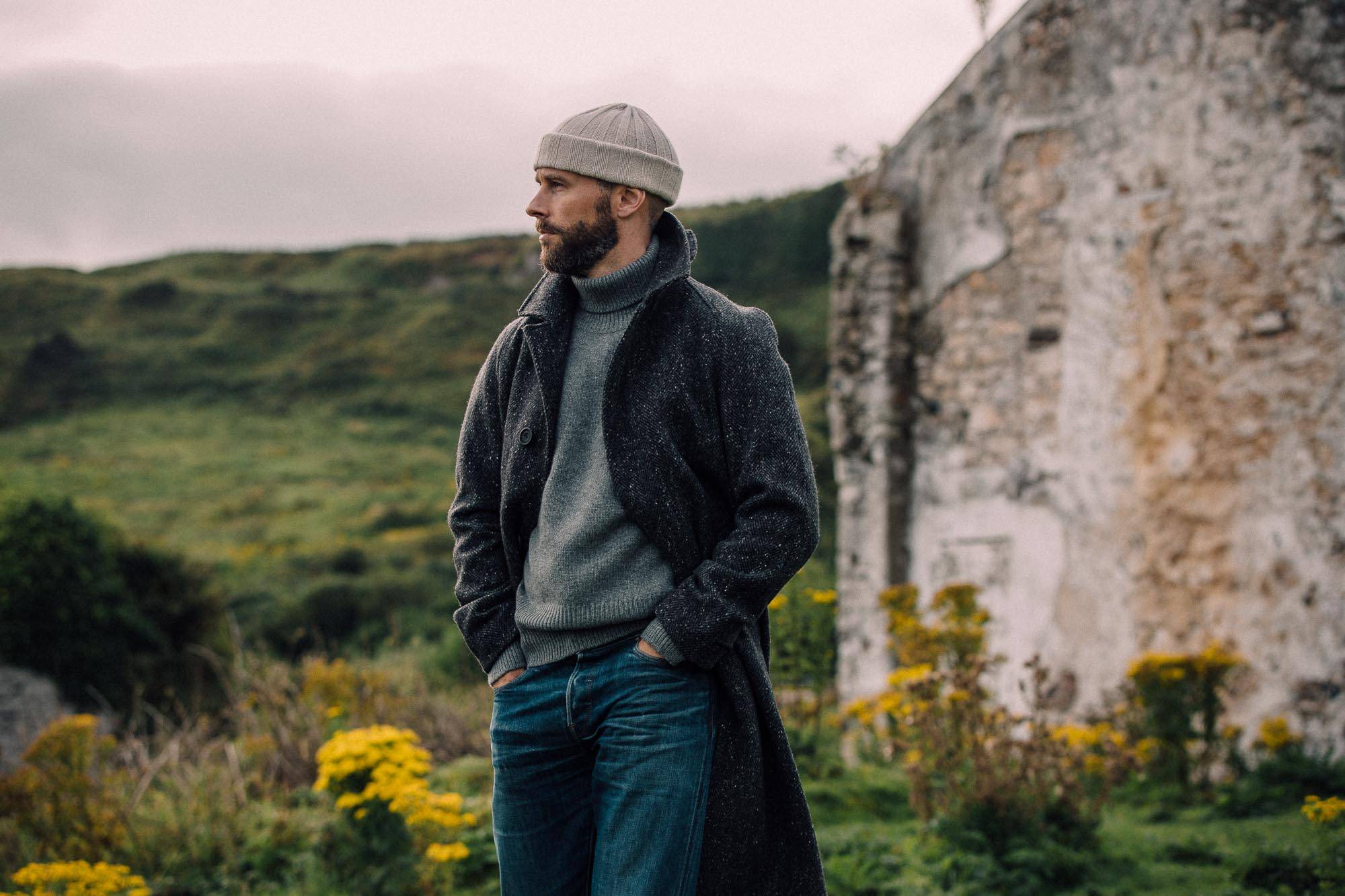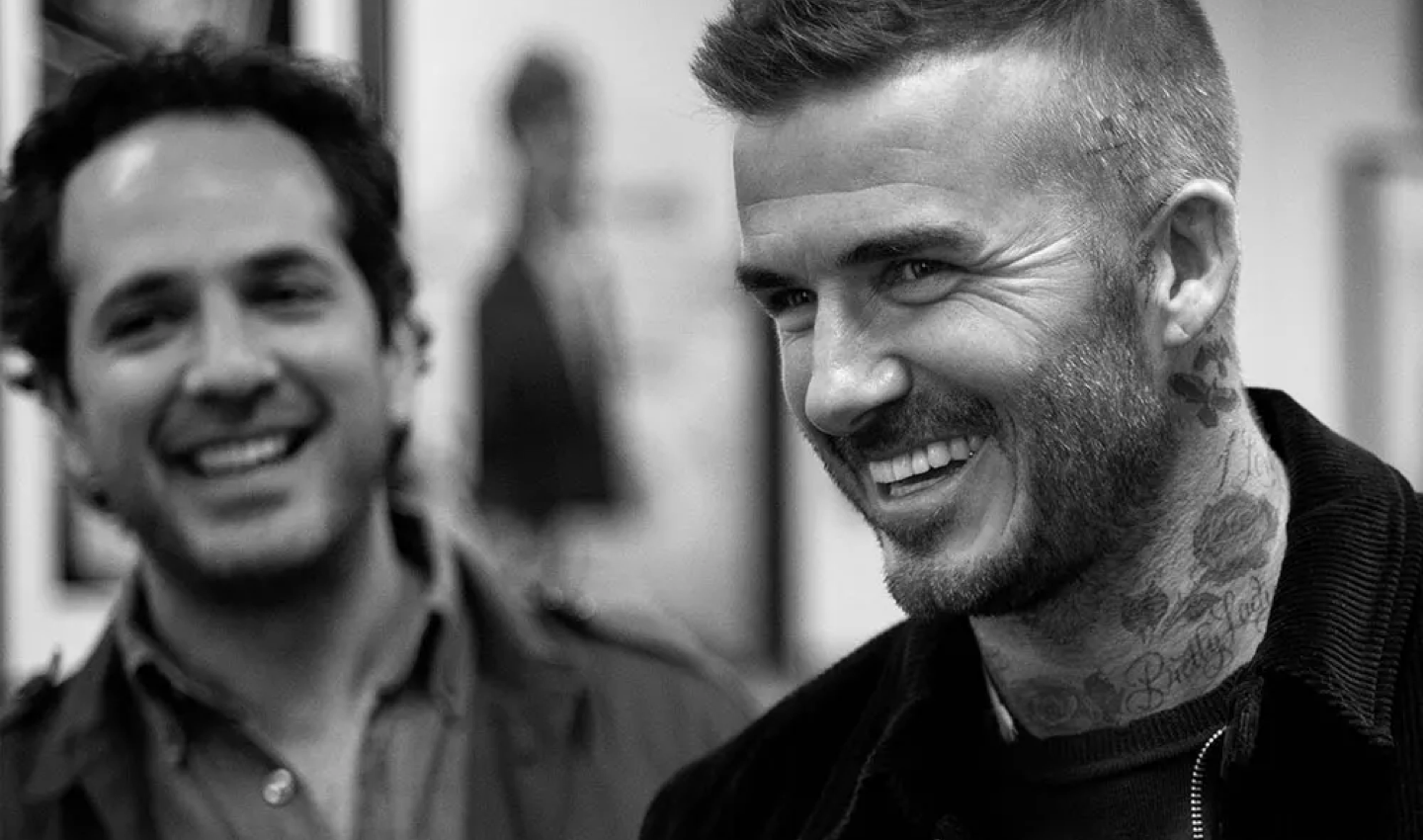The Woolmark
Stop for a moment to think about the overcoat hanging in your closet. The sweaters folded in your bureau. The suits in their garment bags. Chances are, they’re made from wool. Renewable, biodegradable, soft and luxurious merino wool. Wool, it might surprise you to hear – specifically Australian Merino Wool – is also a hardworking, hardwearing technical fibre and the secret ingredient in Private White V.C.’s new collection of outerwear, designed in collaboration with Woolmark.
Private White V.C. has been making coats from wool for ages – they’ve been in the rag trade since 1853 – so this collaboration was a natural pairing. “And Woolmark are champions of all things wool related,” says Mr James Eden, Founder and CEO of Private White V.C.. “Our expertise is not in synthetics, it’s not in nylon, it’s not in polyester.” No, Private White V.C. deals in natural fibres. “I like to say we’re sheep to shop. And the wools we are making in this capsule collection are from the same looms, weavers, and mills that we would have been using as far back as the 1960s and 1970s.”
Merino wool is the star of the show in this collection. In addition to being natural and renewable, wool is biodegradable, wrinkle and odour resistant, and naturally breathable. Each piece was created to be modern and wearable while employing classic construction and design techniques. The range employs innovative and sustainable uses for wool, which is also a thermal regulating fibre – perfect for outerwear. “I like to call it ‘techno-retro’,” says Mr Eden, “we use the same tools and techniques, but apply them to modern design.”
"The wools are from the same looms, weavers, and mills that we would have been using as far back as the 1960s and 1970s" The Manchester factory out of which Private White V.C. is operated today has quite the provenance. A raincoat factory that produced private label products of some of the biggest names in British outerwear, it was bought by a former soldier in His Majesty’s Empire, a certain Private White who served in the WWI. Before the big purchase, Private White had served as an apprentice, become a pattern cutter, and transitioned to general manager. By the end of his life, he owned the place and when he died the factory passed to new management.
Victoria Cross
But that wasn’t the end of his legacy in the trade: enter Mr Eden, the prodigal grandson, who returned to Manchester after a London sojourn to assume ownership of his grandfather’s factory and start a line of men’s clothing – which he named, of course, after Private White. “The V.C. stands for Victoria Cross,” he explains, “which he was awarded after WWI”.
The Manchester factory out of which Private White V.C. is operated today has quite the provenance. A raincoat factory that produced private label products of some of the biggest names in British outerwear, it was bought by a former soldier in His Majesty’s Empire, a certain Private White who served in the WWI. Before the big purchase, Private White had served as an apprentice, become a pattern cutter, and transitioned to general manager. By the end of his life, he owned the place and when he died the factory passed to new management.
But that wasn’t the end of his legacy in the trade: enter Mr Eden, the prodigal grandson, who returned to Manchester after a London sojourn to assume ownership of his grandfather’s factory and start a line of men’s clothing – which he named, of course, after Private White. “The V.C. stands for Victoria Cross,” he explains, “which he was awarded after WWI”.
“I was involved [in the factory] for a long time emotionally,” says Mr Eden from Manchester. “My grandfather was an icon of the trade, a big personality in the family. He left a legacy that people would often talk about around the dinner table.” Though Mr Eden helped out at the factory – counting buttons, cutting fabric – he decided to do the practical thing and go into finance, not fashion, after leaving school. “I went down the rather depressing path of investment banking,” he says. But, three years into his chosen career, he was done, and as fate would have it, his grandfather’s former factory was also at an inflection point... and it was up for sale.
So, Mr Eden made a right turn in his career, headed up north to Manchester, and established Private White V.C.. “We started with raincoats and outerwear,” he says, “the most complicated part of any wardrobe is the outerwear.” The factory had been making this type of garment for years, for big name, high-end super brands so it made sense to begin where they left off. Mr Eden had the benefit of being surrounded by the very best in the field of weaving and garment construction – after all, this was Manchester, also known as the world’s first industrial city, also formerly known as Cottonopolis for its fabric trade.
"We get the best product, the best fabrics, the best prices, the best service..." “It’s Darwinism at its most extreme,” explains Mr Eden. “If you’re still weaving wool in northwest England, you’re an expert.” His suppliers have survived globalisation and outsourcing, and they’ve maintained such a robust local ecosystem, that Private White V.C. can say that their garments are 100 per cent designed and constructed in Manchester. “We get the best product, the best fabrics, the best prices, the best service, etc. etc.,” says Mr Eden.
The Woolmark
Stop for a moment to think about the overcoat hanging in your closet. The sweaters folded in your bureau. The suits in their garment bags. Chances are, they’re made from wool. Renewable, biodegradable, soft and luxurious merino wool. Wool, it might surprise you to hear – specifically Australian Merino Wool – is also a hardworking, hardwearing technical fibre and the secret ingredient in Private White V.C.’s new collection of outerwear, designed in collaboration with Woolmark.
Private White V.C. has been making coats from wool for ages – they’ve been in the rag trade since 1853 – so this collaboration was a natural pairing. “And Woolmark are champions of all things wool related,” says Mr James Eden, Founder and CEO of Private White V.C.. “Our expertise is not in synthetics, it’s not in nylon, it’s not in polyester.” No, Private White V.C. deals in natural fibres. “I like to say we’re sheep to shop. And the wools we are making in this capsule collection are from the same looms, weavers, and mills that we would have been using as far back as the 1960s and 1970s.”
Merino wool is the star of the show in this collection. In addition to being natural and renewable, wool is biodegradable, wrinkle and odour resistant, and naturally breathable. Each piece was created to be modern and wearable while employing classic construction and design techniques. The range employs innovative and sustainable uses for wool, which is also a thermal regulating fibre – perfect for outerwear. “I like to call it ‘techno-retro’,” says Mr Eden, “we use the same tools and techniques, but apply them to modern design.”
"The wools are from the same looms, weavers, and mills that we would have been using as far back as the 1960s and 1970s" The Manchester factory out of which Private White V.C. is operated today has quite the provenance. A raincoat factory that produced private label products of some of the biggest names in British outerwear, it was bought by a former soldier in His Majesty’s Empire, a certain Private White who served in the WWI. Before the big purchase, Private White had served as an apprentice, become a pattern cutter, and transitioned to general manager. By the end of his life, he owned the place and when he died the factory passed to new management.
Victoria Cross
But that wasn’t the end of his legacy in the trade: enter Mr Eden, the prodigal grandson, who returned to Manchester after a London sojourn to assume ownership of his grandfather’s factory and start a line of men’s clothing – which he named, of course, after Private White. “The V.C. stands for Victoria Cross,” he explains, “which he was awarded after WWI”.
The Manchester factory out of which Private White V.C. is operated today has quite the provenance. A raincoat factory that produced private label products of some of the biggest names in British outerwear, it was bought by a former soldier in His Majesty’s Empire, a certain Private White who served in the WWI. Before the big purchase, Private White had served as an apprentice, become a pattern cutter, and transitioned to general manager. By the end of his life, he owned the place and when he died the factory passed to new management.
But that wasn’t the end of his legacy in the trade: enter Mr Eden, the prodigal grandson, who returned to Manchester after a London sojourn to assume ownership of his grandfather’s factory and start a line of men’s clothing – which he named, of course, after Private White. “The V.C. stands for Victoria Cross,” he explains, “which he was awarded after WWI”.
“I was involved [in the factory] for a long time emotionally,” says Mr Eden from Manchester. “My grandfather was an icon of the trade, a big personality in the family. He left a legacy that people would often talk about around the dinner table.” Though Mr Eden helped out at the factory – counting buttons, cutting fabric – he decided to do the practical thing and go into finance, not fashion, after leaving school. “I went down the rather depressing path of investment banking,” he says. But, three years into his chosen career, he was done, and as fate would have it, his grandfather’s former factory was also at an inflection point... and it was up for sale.
So, Mr Eden made a right turn in his career, headed up north to Manchester, and established Private White V.C.. “We started with raincoats and outerwear,” he says, “the most complicated part of any wardrobe is the outerwear.” The factory had been making this type of garment for years, for big name, high-end super brands so it made sense to begin where they left off. Mr Eden had the benefit of being surrounded by the very best in the field of weaving and garment construction – after all, this was Manchester, also known as the world’s first industrial city, also formerly known as Cottonopolis for its fabric trade.
"We get the best product, the best fabrics, the best prices, the best service..." “It’s Darwinism at its most extreme,” explains Mr Eden. “If you’re still weaving wool in northwest England, you’re an expert.” His suppliers have survived globalisation and outsourcing, and they’ve maintained such a robust local ecosystem, that Private White V.C. can say that their garments are 100 per cent designed and constructed in Manchester. “We get the best product, the best fabrics, the best prices, the best service, etc. etc.,” says Mr Eden.






Leave a comment
This site is protected by hCaptcha and the hCaptcha Privacy Policy and Terms of Service apply.